Randy Alcorn's Blog, page 7
July 4, 2025
Congratulations to My Grandson Jake and His New Bride Richie!

Our grandson Jake got married to Richie in Phoenix on June 20, the first of our five grandsons to get married. Getting to know Richie and gaining a granddaughter has been delightful! Their wedding was beautiful and wonderful. The only thing missing was Nanci. ♥️♥️♥️
However, I believe Scripture suggests our loved ones now in Heaven are sometimes witnessing, in at least some capacity, God’s unfolding plan on Earth. My own mom died just four months after our Angie, Jake’s mom, was born. Nanci and I believed that at both our daughters’ weddings, in the summer of 2001, the girls’ two grandmothers were watching from Heaven. And since Nanci’s mom had been blind her last few years here, she was seeing the wedding in a way she couldn’t have even before she died. Now 24 years later, I truly believe God gave Nanci a front-row seat to her own grandson’s wedding. 🙏❤️🎉

Jake’s brother Ty, Jake, Richie, Nanci’s and my daughter Angie, and her husband Dan Stump:

The pronouncement of marriage, by Pastor Costi Hinn:
https://www.youtube.com/watch?v=70c2wVof-fY?si=-ReCrjvk4-emPD_X
Here’s Jake dancing with his mom, our daughter Angela. She was so happy for her son, I don’t think she stopped smiling the entire day!

A few days ago Jake and I talked on the phone about the wedding and honeymoon. Richie, who calls me “Pops” as Jake does, joined the conversation. It was wonderful to hear the joy in their voices. Of course they know, as we all should, that life is challenging and a good marriage takes hard work. It certainly did for Nanci and me. The best things in life, including marriage and parenting, aren’t easy, but when we draw on the empowering grace and truth of Jesus, they become incredibly rewarding.
At the wedding I spent some great time with our daughter Karina, her husband Dan Franklin, and their boys Matt, Jack, and David. Angie and I had lunch together after returning home from the wedding in Phoenix. We talked about the sheer happiness of the day with Jake and Richie and family and friends. Then we talked about how much we both missed Nanci. Both of us cried, but that’s how it should be. “We are sorrowful, yet always rejoicing” (2 Corinthians 6:10). The only way to avoid grief is to avoid love. And to avoid love is to avoid the best part of being alive.
Sorrow is real but in no way did it eclipse the joy of Jake and Richie’s wedding. Resurrection and eternal life await—Angela, Karina and our sons-in-law and grandchildren and friends who love Jesus will one day be with Jesus and each other forever. Nanci and Richie haven’t met each other yet but they certainly will. And knowing both of them, I guarantee they will adore each other!
I thank God for the 54 years of friendship and 47 years of marriage He gave me and Nanci. I am profoundly grateful that in our final years of marriage, as we loved and trusted and cherished each other more than we ever had.
This is wedding season, and I'm sure many of you will also be going to weddings over the next few months. If you're married, be sure to use this opportunity to think in terms of cultivating and preserving your marriage. If you're not married, do what you can to support the sanctity of marriage and uphold the importance of this sacred gift and trust God has imparted to humanity.
For those with children, let me remind you that the best two gifts you can give them is that you love the Lord with all your heart, and that you love each other unreservedly. They will find security in your love. And as important as raising children is, remember too that it was your wife or husband with whom you exchanged vows. Children are entrusted to us for perhaps twenty years, what may be a third or fourth of our lives. By God's grace, some of us will be married to our spouses for fifty years or more.
Don't make your family all about your children’s activities. Love, honor, and serve your husband or wife. Carve out time for them. Go out for dates. Do dinner and a movie. Go out of town together. Put Christ in the center of your life and conversation. Thank Him together for His goodness and kindness, not only for the big things, but also for His small daily provisions of common grace.
In a culture that glorifies selfishness and immorality, cultivate and preserve your marriage. God will be honored, and your children and grandchildren will be grateful. And people will see a signpost that points to Christ's love for His bride (Ephesians 5).
I thank God for Nanci, my partner in the great adventure God laid out for us. And now as Jake and Ritchie begin their life together, I pray they would look to Jesus every day as their Savior, Redeemer, and ever-present Friend.
Some marriage advice for everyone:
“If any of you lacks wisdom, ask God...” James 1:5
“Don’t let the sun go down while you’re still angry.” Ephesians 4:26
“I have learned to be content...” Philippians 4:11
“Carry each other’s burdens...” Galatians 6:2
“Above all, love each other deeply...” 1 Peter 4:8
Speaking of the challenges and joys of marriage, I was touched by this video from our friend Joni Eareckson Tada, celebrating her and Ken’s 43rd wedding anniversary. This is a couple who has leaned hard on Jesus:
View this post on InstagramA post shared by Joni and Friends (@joniandfriends)
July 2, 2025
Why Should We Care about Eternal Rewards and Crowns, Since We’ll Cast Them at Jesus’s Feet Anyway?

I think the doctrine of eternal rewards is critically important, yet greatly misunderstood. Scripture is full of references to it. Here are some materials I’ve researched and presented to groups on this subject. The great majority of this is just Scripture, which I’ve organized.
Paul said, “I consider that our present sufferings are not worth comparing with the glory that will be revealed in us” (Romans 8:18). “For our light and momentary troubles are achieving for us an eternal glory that far outweighs them all” (2 Corinthians 4:17).
Notice that Paul speaks not of a glory achieved for Christ but “for us.” Likewise, Jesus didn’t say, “Store up for me treasures in heaven”; he said, “Store up for yourselves treasures in heaven” (Matthew 6:20, italics mine). Of course, only Christ will be honored as the object of our worship in Heaven. We will gladly lay our crowns, our rewards, before His throne, so He receives the ultimate glory (Revelation 4:10-11). Yet Scripture teaches that we will not only behold His glory but also participate in it (Romans 8:18-19).
Crowns are a common symbol of ruling power, though they may symbolize other rewards as well. Five crowns are mentioned in the New Testament:
1. The Crown of Life—given for faithfulness to Christ in persecution or martyrdom (James 1:12; Revelation 2:10).
2. The Incorruptible Crown—given for determination, discipline, and victory in the Christian life (1 Corinthians 9:24-25).
3. The Crown of Rejoicing—given for pouring oneself into others in evangelism and discipleship (1 Thessalonians 2:19; Philippians 4:1).
4. The Crown of Glory—given for faithfully representing Christ in a position of spiritual leadership (1 Peter 5:1-4). (Note that a prerequisite is being “not greedy for money, but eager to serve.” A Christian leader’s preoccupation with money can forfeit this reward.)
5. The Crown of Righteousness—given for joyfully purifying and readying oneself to meet Christ at his return (2 Timothy 4:6-8).
There’s nothing in this list that suggests it is exhaustive. There may be innumerable crowns and types of crowns and rewards unrelated to crowns. But all are graciously given by the Lord Jesus in response to the faithful efforts of the believer.
These crowns bring glory to Christ as they are laid before His feet (Revelation 4:10), showing that our rewards are given not merely for our recognition but for God’s glory. Although God’s glory is the highest reason for any action, Scripture sees no contradiction between God’s eternal glory and our eternal good. On the contrary, glorifying God will always result in our greatest eternal good. Likewise, pursuing our eternal good, as He commands us to do, will always glorify God. False humility that says, “I want no reward,” effectively means, “I want nothing to lay at Christ’s feet to bring Him glory.”
We are to guard our crowns carefully (Revelation 3:11). Why? Because we can be disqualified from receiving them (1 Corinthians 9:27). We can lose them (1 Corinthians 3:15). They can be taken from us (Matthew 25:28-29). We can seek our rewards from men, thereby forfeiting them from God (Matthew 6:5-6). John warns, “Watch out that you do not lose what you have worked for, but that you may be rewarded fully” (2 John 8). We can fail to earn rewards, and we can forfeit rewards already in our account.
A crown is a symbol of a position of authority given by God. Some people have told me, “We’ll get the crowns, yes, but according to this passage, we’ll no longer have them, because we’ll lay them before the throne so that God is the only one who has authority.” That’s not what this passage is saying. Those who lay them before the throne are dedicating their position and their God-given authority to Him. They’re saying, “I’m going to serve you.” But when they walk away from His throne room, they’re still in that position of leadership.
Paul spoke about the Philippians’ financial giving, explaining, “Not that I am looking for a gift, but I am looking for what may be credited to your account” (Philippians 4:17). God keeps an account open for us in Heaven, and every gift given for His glory is a deposit in that account. When we give, we withdraw funds from our earthly account to have them credited to our heavenly account. Not only God, not only others, but we are the eternal beneficiaries of our giving.
Still, some sincere, Bible-believing Christians really struggle with the concept of eternal rewards. But here’s the incredible thing, the factor that turns the entire debate on its head: it wasn’t our idea that God would reward us. It was His idea! Satan didn’t make up the idea of incentives. Our sin nature didn’t make it up. A corrupt world didn’t make it up. God made it up. He designed us to need incentives to motivate us to do our jobs and do them well.
We flatter ourselves—and insult God—when we say, “I don’t care about reward.”
God will reward the child who gave to the missions offering the money she’d saved for a softball mitt. He’ll reward the teenager who kept himself pure despite all the temptations. He’ll reward the man who tenderly cared for his wife with Alzheimer’s, the mother who raised the child with cerebral palsy, the child who rejoiced despite his handicap. He’ll reward the unskilled person who was faithful and the skilled person who was meek and servant-hearted. He’ll reward the parents who modeled Christ to their children and the children who followed Him despite their parents’ bad example. He’ll reward those who suffered while trusting Him, and those who helped the ones who were suffering. He’ll reward the couple who downsize, selling their large house to live in a small one and give all the money away to missions.
He doesn’t have to reward anyone for anything. He does it because He wants to! And make no mistake, regardless of what you and I think about it, that’s exactly what He’s going to do: “For the Son of Man is going to come in his Father’s glory with his angels, and then he will reward each person according to what he has done” (Matthew 16:27).
Recommended Reading
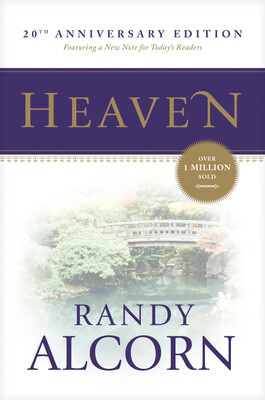 Heaven
Heaven 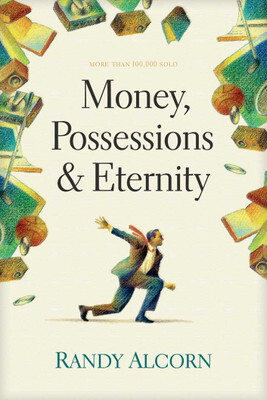 Money, Possessions and Eternity
Money, Possessions and Eternity 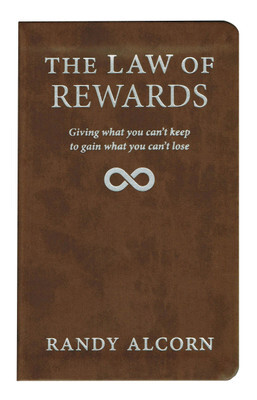 The Law of Rewards (Special Edition)
The Law of Rewards (Special Edition)
June 30, 2025
Cancer, Trusting God’s Plan, and Thoughts on Pursuing Treatments and When to Stop

A reader asked me this thoughtful question:
I was recently diagnosed with cancer. I am struggling with whether I should go through treatments from a biblical perspective. While I am not asking for advice on whether or not to undergo treatment, I would like to know how Randy and Nanci made the decision to go through treatments that are extremely difficult. Does Randy feel like they made the right decision?
Nanci and I had no regrets about the treatments we chose. Yes, some of Nanci’s treatments were difficult, but it was always what she wanted, and the Lord gave her four more years from her diagnosis. She wasn’t desperately clinging to this life, nor was she giving up her quality of life.
Nanci really did look forward to being with Jesus and one night asked me, “Can we change our prayer? Instead of asking Him to heal me, like we have for so long, can we ask Him, ‘If you don’t plan to heal me, would you please take me home?’” There was no bitterness or desperation; we were both content to change our prayer, which was hard in some ways, but not because we felt like we were giving up. Rather, we were giving ourselves over to God’s plan.
Nanci wanted to fight the cancer, knowing that sometimes treatments work. Finally, she didn’t want the chemo anymore because it wasn’t working.
In her last journal entry, written about a month before she died, she wrote:
Very important consultation with my doctor. It was decided that I will go on chemo pills, and I told her that I don’t want to fight the cancer in order to give me more time. She thinks maybe I have 1½ years or so.
So now we have a better feel for a game plan.
I am so relieved, and honestly excited! I will see Jesus pretty soon!
If you choose to take reasonable steps to give yourself more time, and you feel it’s worth it, go for it. We are promised that we will be given wisdom when we seek it from the Lord, who gives generously (James 1:5). By all means, seek advice from your doctors and from wise people in your life who love you and love the Lord.
But always resolve that when the right time comes, if it does, you are willing to quit treatments and go to Jesus whenever He wishes. “For if we live, we live to the Lord, and if we die, we die to the Lord. So then, whether we live or whether we die, we are the Lord’s” (Romans 14:8).
Meanwhile, meditate on Scripture and read good books to prepare you to meet your King. And use your remaining time to have good interactions with your loved ones and say whatever needs to be said sooner, not later.
God is good and kind and absolutely faithful. Nanci and I knew that to be true before her four plus years of dealing with cancer, but we saw Him in so many ways it brings tears of profound gratitude to my eyes right now as I type this.
Because of the Lord’s great love we are not consumed,
for his compassions never fail.
They are new every morning;
great is your faithfulness.
Lamentations 3:22–23
Here’s what I wrote on the three-year anniversary of Nanci’s homegoing. And here’s an index of many other blogs about Nanci’s cancer journey.
Recommended Reading
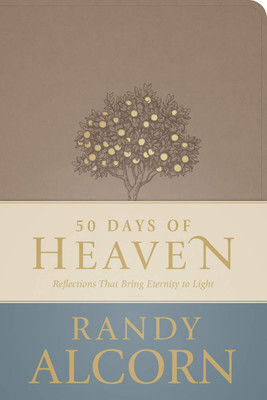 50 Days of Heaven (Special Edition)
50 Days of Heaven (Special Edition) 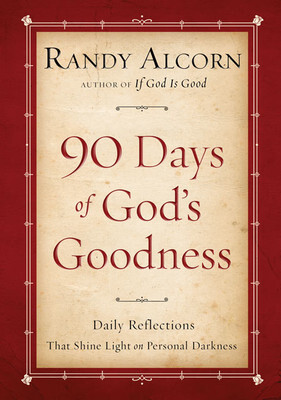 90 Days of God's Goodness
90 Days of God's Goodness  We Shall See God
We Shall See God
June 27, 2025
Pray for Our Brothers and Sisters in Israel and Iran and Across the Middle East

Headlines from the Middle East, and specifically the Israel-Iran conflict, have dominated the news lately. Here are some insights about believers in Israel and Iran that can help you know how to pray.
Our ministry received an update from Kehilat Ha Maayan, a Messianic congregation comprised of mostly Jewish and also Gentile born-again believers in Yeshua (the Hebrew name of Jesus). Thirty years ago, I was in Israel to speak at prolife events, and Nanci and I visited that church in Kfar Saba, Israel, pastored by Tony Sperandao, back in October 1995.
I remember the date because we were at a Feast of Tabernacles celebration put on by the Christian Embassy. There Prime minister Yitzhak Rabin spoke to us, and we were sitting maybe sixty feet from him. A few weeks after we returned, the prime minister was assassinated, the first and only murdered head of state in modern Israel.
It was surreal to have been so close to Rabin, then to be home with our daughters and hear of the assassination just a few weeks later. We watched the news and recognized various bodyguards, including one who stood very near us. A sobering memory.
Here’s part of an update from the church:
For all of us, this war is unlike any war we have had since 1948, the War of Independence. Many of our members do not have a bomb shelter they can readily access in 90 seconds. They must stand outside their homes in the stairways, or run to a common neighborhood shelter, which is difficult at nighttime especially with small children and elderly people.
…By God’s miracles, most of the ballistic missiles have been intercepted before they entered Israeli airspace, but the few that do, cause horrific damage in various cities like Tel Aviv, Bat Yam, Haifa, Be’er Sheva and others. And yet, many lives were spared by God’s supernatural intervention. As of this writing, over 25,000 homes have been destroyed. We have, via our distribution center, donated clothes and toys to the families who are left with nothing. Later this week, we will visit and hand out food coupons.
…Now more than ever, our people are staring at eternity. Many are interested in knowing more about God, and those who we have shared with about Yeshua, our Savior, are asking relevant questions.
The church asks for prayer for strength and wisdom to reach out to those they meet through divine appointments, as they care for people’s emotional wounds from the last two years.
Read the full update, and see more prayer requests, here.
On the subject of Iran, Naghmeh Panahi, a former Iranian house-church leader, shared these news headlines:
The Times of Israel: Iran says 700 arrested for wartime ties with Israel; 3 alleged Mossad agents hanged
NBC News: Execution of 3 accused of spying and mass detentions fuel crackdown fears in Iran
She wrote in response on Facebook:
Dear friends,
[These] last few weeks have been so hard and such an emotional roller coaster.
I would like to ask you to continue to pray for the Iranian people and specially for the underground house churches.
The Iranian regime is on a rampage of arresting and executing anyone they suspect as working with Israel. They are randomly checking phones and if there are any likes of posts that the Iranian government perceives as anti regime, they are arresting.
The underground house churches in Iran are in great danger. Not only have they been heavily persecuted because of following Jesus, but they have been accused of working with Israel and America and are often given political charges and heavy prison sentences.
There [are] also concerns that Iran will shut down all forms of communication with the outside world (much like North Korea) to be able to better control the Iranian people.
The situation for the Iranian people has gotten worse specially for the underground house churches.
Please keep them in your prayers as they continue to share the Gospel to people around them who are struggling with fear and hopelessness.
Elam Ministries, an organization EPM recommends, shared this remarkable story:
Last week Hanieh*, a believer inside Iran, was walking the streets of her city praying for protection and peace. As she listened to worship music, she prayed that God would continue to show the Iranian church how to be salt and light amid the chaos and fear. Then she saw a family ahead of her on the street, clearly dismayed and distressed. She went over to them, and began to talk and pray with them. They, like many others at this time, were hungry for hope and their hearts warmed as she shared the Gospel with them.
There on the street in a war-torn city, Hanieh had the privilege of leading the whole family in prayer as they put their trust in Christ.
Hanieh is one of many Christians in Iran who are committed to continuing to serve Christ in these dark days.
*Name changed for security.
See their website for more ways to pray for Iran.
My friend Greg Laurie writes, “Let’s pray for a powerful spiritual awakening in the hearts of the Iranian people. I’ve heard remarkable stories of millions coming to Christ, despite their government’s attempts to suppress the gospel. You can’t stop the Word of God! Let’s also pray that many Israelis come to see Jesus as their Messiah during this time of crisis.”
Our brothers and sisters in Syria also need prayer; last Sunday there were violent attacks on churches. Ananias House, a ministry serving those in the Middle East, reports that at least 25 people are dead, with the count continuing to rise as the more than 60 wounded are treated.
“Continue to remember those in prison as if you were together with them in prison, and those who are mistreated as if you yourselves were suffering” (Hebrews 13:3).
Recommended Reading
 Safely Home
Safely Home
June 25, 2025
Since Satan Knows the Ultimate Outcome of God’s Plan, Why Does He Continue Opposing God?

A reader wrote me this insightful message:
If Satan is familiar with the Bible, and knows what John wrote in Revelation, why does he bother when he knows the ultimate outcome?
I think, although I have no specific scriptural support for it, that Satan is the ultimate egomaniac. That being the case, he might overestimate his “power” (which is clearly under God’s control) and be delusional about his role in the events of the last days, thinking he might somehow really be like The Most High. Another possible explanation is that he knows full well that he loses in the end, and is determined to make the lives of Christians on earth as “hellish” as possible, knowing this is as close to hell as we will ever get.
I believe this person’s comments are right on target: “I think…that Satan is the ultimate egomaniac. That being the case, he might overestimate his ‘power’ (which is clearly under God’s control).”
Let’s look at some Scripture that supports this conclusion.
Satan and angels are created beings; and, as such, are totally subservient to God and limited in all their powers compared with the Sovereign and Omnipotent Creator. “For by Him all things were created, both in the heavens and on earth, visible and invisible, whether thrones or dominions or rulers or authorities—all things have been created by Him and for Him” (Colossians 1:16). “For I am convinced that neither death, no life, no angels, nor principalities, nor things present, nor things to come, nor powers, nor height , nor depth, nor any other created thing, shall be able to separate us from the love of God, which is in Christ Jesus our Lord” (Romans 8:38-39). “For the devil has sinned from the beginning. The Son of God appeared for this purpose, that He might destroy the works of the devil” (1 John 3:8).
Satan and his fallen angels (demons) are, however, powerful, crafty, intelligent, deceitful, and committed to (permanently sealed into) opposing God. “Be of sober spirit, be on the alert. Your adversary, the devil, prowls about like a roaring lion, seeking someone to devour” (1 Peter 5:8). “In which you formerly walked according to the course of this world, according to the prince of the power of the air, of the spirit that is now working in the sons of disobedience” (Ephesians 2:2). “You are of your father the devil, and you want to do the desires of your father. He was a murderer from the beginning, and does not stand in the truth, because there is no truth in him. Whenever he speaks a lie, he speaks from his own nature; for he is a liar, and the father of lies” (John 8:44).
As created beings, Satan and angels (fallen or not) do not know God’s plan (except for that which is revealed). They do not know what God’s decree contains, until it actually happens. “But of that day or hour no one knows not even the angels in heaven, nor the Son, but the Father alone” (Mark 13:32).
Satan and the angels cannot read minds. Nowhere does Scripture mention this capability for any creature. Yet, it specifically asserts God’s ability to know an individual’s mind: “Even before a word is on my tongue, behold, O LORD, you know it altogether” (Psalm 139:4); “But He knew what they were thinking” (Luke 6:8)
Satan, demons, and fallen humans all know that God is real. “Now there was a day when the sons of God came to present themselves before the Lord, and Satan also came among them.” (Job 1:6). “You believe that God is one. You do well; the demons also believe, and shudder” (James 2:19). “Because that which is known about God is evident within them; for God made it evident to them. For since the creation of the world His invisible attributes, His eternal power and divine nature, have been clearly seen, being understood through what has been made, so that they are without excuse” (Romans 1:19-20).
Satan’s entire delusion is that he is “like God.” This is the reason he fell and introduced sin into the creation. “How you have fallen from heaven, O star of the morning, son of the dawn! You have been cut down to the earth, you who have weakened the nations! But you said in your heart, ‘I will ascend to heaven; I will raise my throne above the stars of God, and I will sit on the mount of assembly in the recesses of the north. I will ascend above the heights of the clouds; I will make myself like the Most High. Nevertheless you will be thrust down to Sheol, to the recesses of the pit” (Isaiah 14:12-15).
He presented the same deluded idea to Adam and Eve, and they chose it too. “For God knows that in the day you eat from it your eyes will be opened, and you will be like God, knowing good and evil” (Genesis 3:5). This is an intoxicating delusion. One who is operating their life based on “illusions of grandeur” will act irrationally consistent with their mental (or spiritual) illness.
Therefore, even though fallen creatures know the revealed truth, and know that God exists, it is irrelevant to them. Satan is convinced that he is free to act, smarter than God, and able to thwart God’s plan. “Then Satan answered the LORD and said, ‘Does Job fear God for no reason? …But stretch out your hand and touch all that he has, and he will curse you to your face’” (Job 1:9, 11).
At every point Satan is focused on opposing God (for example, the temptation of Jesus in Matthew 4:1-11). Fallen humans also oppose God: “Professing to be wise, they became fools, and exchanged the glory of the incorruptible God for an image in the form of corruptible man and of birds and four-footed animals and crawling creatures” (Romans 1:22-23).
Satan sometimes poses as an angel of light and offers counterfeit religions based on subtle misinformation: “For such men are false apostles, deceitful workers, disguising themselves as apostles of Christ. And no wonder, for even Satan disguises himself as an angel of light. Therefore it is not surprising if his servants also disguise themselves as servants of righteousness” (2 Corinthians 11:13-15). Other times his counterfeit religions are outright pagan: “And served their idols, which became a snare to them. They even sacrificed their sons and their daughters to the demons” (Psalm 106:36-37); “I say that the things which the Gentiles sacrifice, they sacrifice to demons, and not to God; and I did not want you to become sharers in demons” (1 Corinthians 10:20).
His final delusion will be with the Antichrist, and the only reason this will happen is the Lord removing the restraint: “Who opposes and exalts himself above every so-called god or object of worship, so that he takes his seat in the temple of God, displaying himself as being God.....And you know what restrains him now, so that in his time he may be revealed....The one whose coming is in accord with the activity of Satan, with all power and signs and false wonders” (2 Thessalonians 2:4, 6, 9).
Satan considers himself successful in his opposing God. However, since he is created, even he and his demons are part of God’s decree. As such, Satan cannot do anything that is not allowed by God. And everything Satan is allowed to do brings about the eternal plan of God to His Glory. “Then the Lord said to Satan, ‘Behold, all that he has is in your power, only do not put forth your hand on him.’ So Satan departed from the presence of the Lord” (Job 1:12). “He commands even the unclean spirits, and they obey Him” (Mark 1:27). “And angels who did not keep their own domain, but abandoned their proper abode, He has kept in eternal bonds under darkness for the judgment of the great day” (Jude 6).
Satan is so thoroughly deluded about his ultimate success over the Lord that he actually attempts a physical overthrow. This same blinding delusion is reflected in the men whom he uses in the end times: “…by means of the hypocrisy of liars seared in their own conscience as with a branding iron” (1 Timothy 4:2). “And there was war in heaven, Michael and his angels waging war with the dragon. And the dragon and his angels waged war, and they were not strong enough, and these was no longer a place found for them in heaven. And the great dragon was thrown down, the serpent of old who is called the devil and Satan, who deceives the whole world” (Revelation 12:7-9).
So, the answer to this person’s original question is summed up in the statement “seared in their own conscience as with a branding iron.” Satan is so delusional that, in his blinding hatred opposing God, he willingly fulfills God’s decree as it is plainly revealed and known by him.
The devil cannot oppose God more vigorously than the way described in the final chapter of Revelation. He thus willingly charges into the face of sure defeat fully confident of victory. Such is the nature of evil. “And I saw an angel coming down from heaven, having the key of the abyss and a great chain in his hand. And he laid hold of the dragon, the serpent of old, who is the devil and Satan, and bound him for a thousand years” (Revelation 20:1-2). Even after 1,000 years to contemplate the truth of the Scriptures, when he is finally released, Satan goes right back to opposing God exactly as described in Revelation. “And when the thousand years are completed, Satan will be released from his prison, and will come out to deceive the nations... And the devil who deceived them was thrown into the lake of fire” (Revelation 20:7-10).
If Satan was free to decide not to do what the Bible reveals he will do, then Satan would be more powerful than God. God would be proven not to be Sovereign. Additionally, God tells us He is Truth (“I am the way, the truth, and the life,” John 14:6) and His Word is Truth (John 17:17); if, in fact, Satan could decide that he will not act as prophesied in Revelation, then the Word would be false. If the Word is false, and it is the source that reveals both God and Satan, then nothing could be believed about either.
Recommended Reading
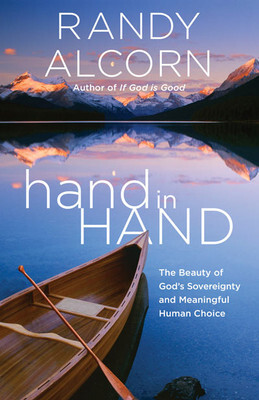 hand in Hand
hand in Hand  If God Is Good (Paperback)
If God Is Good (Paperback)
June 23, 2025
10 Verses That Have Shaped Me

I grew up in an unbelieving home, but at age 15 I came to faith in Jesus while reading the Bible. As a new believer, I couldn’t get enough of God’s Word. I learned the Bible doesn’t contradict itself, but it does contradict me— and I desperately need those mid-course corrections! Scripture was the North Star to which I fixed my life’s compass. Fifty-five years later, that’s truer than ever.
What a privilege it is to spend time in God’s Word! There's nothing like it. Its depths are endless. You can never exhaust it. Day after day, year after year, it always has more to offer. “Let me understand the teaching of your precepts; then I will meditate on your wonders” (Psalm 119:27). Through Scripture, the Holy Spirit transforms our hearts and minds. His Word is the source of correction, training, eternal perspective, and joyful rest from weariness and sorrow.
Here are ten verses that have especially shaped my life and ministry.
“So we fix our eyes not on what is seen, but on what is unseen, since what is seen is temporary, but what is unseen is eternal.” (2 Corinthians 4:18, NIV)
Even though as Christians we affirm the reality of the spiritual realm, sometimes we succumb to the naturalistic assumption that what we see is real and what we don’t see isn’t. Many people conclude that God can’t be real because we can’t see Him, and Heaven can’t be real because we can’t see it. But we must recognize our blindness. The blind must take by faith that there are stars in the sky. If they depend on their ability to see, they will conclude there are no stars.
That’s why 2 Corinthians 4:18 is my life verse. Once you catch a glimpse of the other world, the real world, you are weaned from the illusion that reality is limited to our five senses. You can't help but live differently once you learn to see with an eternal perspective!
“In the beginning was the Word, and the Word was with God, and the Word was God. …And the Word became flesh and made his dwelling among us. We have seen his glory, glory as of the only Son from the Father, full of grace and truth.” (John 1:1, 14)
Although they are several verses apart, I have always thought of these two verses as inseparable from each other. When we go back to Genesis, we learn that Eden’s greatest attraction was God’s presence. Sin’s greatest tragedy was that God no longer dwelt with His people. But this all changed because of Jesus, and John 1:1 sets it up: “In the beginning was the Word and the Word was with God, and the Word was God.”
Then comes this verse that bursts forth like fireworks: “The Word became flesh and made his dwelling among us. We have seen his glory, the glory of the one and only Son, who came from the Father, full of grace and truth” (John 1:14). The God who lives in unapproachable light became approachable in the person of Jesus! People could look at Jesus and see who God is. He is Immanuel, “God with us.” And He is not only all about truth, He is also all about grace—a grace that delivers us from the Hell we deserve and grants us the Heaven we don’t deserve.
In a redemptive work far greater than most imagine, Christ bought and paid for our future and the earth’s, ensuring an unending future where we will dwell with the Word who became flesh.
“For you know the grace of our Lord Jesus Christ, that though he was rich, yet for your sake he became poor, so that you by his poverty might become rich.” (2 Corinthians 8:9)
As we learn to give, we draw closer to God. But no matter how far we move along in the grace of giving, Jesus Christ remains the matchless Giver, who for our sakes “became poor, so that you through his poverty might become rich” (2 Corinthians 8:9, NIV). “Rich” in this sense is not about finances, and this is not the health and wealth gospel; God gives to us in a thousand ways besides material prosperity. Our greatest resources are spiritual, not material. They come from another world, not this one.
Scripture says Christ gave “himself as a ransom for all people” (1 Timothy 2:6, NIV). Jesus, the sinless one, willingly gave Himself over to be tortured—not for anything He had done, but to save those least deserving. We can never outgive God! Meditate on the truth of that for a few million years. (We will—we may as well get a head start.)
“…remembering the words that the Lord Jesus himself said, ‘There is more happiness in giving than in receiving.’” (Acts 20:35, GNT)
You might have heard that verse translated as “It is more blessed to give than receive,” but the well-documented fact is that the Greek word makarios, translated “blessed,” really means “happy-making.”
Notice what Jesus did not say: “Naturally, we’re happier when we receive than when we give, but giving is a duty, so grit your teeth, make the sacrifice, and force yourself to give.”
Money won’t make us happy, but giving away money can make us profoundly happy! When we give out of love for Christ and others, we experience dramatic and lasting returns for the investments we’ve made—far more than if we’d kept or spent it. Counterintuitive as it may seem, our greatest good, and the happiness that accompanies it, is found in giving, not receiving.
“Clothe yourselves, all of you, with humility toward one another, for ‘God opposes the proud but gives grace to the humble.’ Humble yourselves, therefore, under the mighty hand of God so that at the proper time he may exalt you...” (1 Peter 5:5–6)
An unattributed quote says, “Only the humble are sane.” Choose pride and you get God’s opposition. Choose humility and you get God’s grace. This is why the proud fall away while the humble endure. It’s why none of us should ever view ourselves as celebrities, only servants. We are God’s errand boys and girls. And what a privilege that is!
God humbles us in the ways He knows best. Two of the best things God ever did for me were to give me a chronic disease (insulin-dependent diabetes), and abortion-clinic lawsuits that forced me to resign as pastor of the church I loved. I wouldn’t have chosen either, but I’d gladly take both rather than give up what I’ve learned about trusting God. Through our thorns in the flesh God says, “My grace is sufficient for you, for my power is made perfect in weakness” (2 Corinthians 12:9).
“And we know that for those who love God all things work together for good, for those who are called according to his purpose.” (Romans 8:28)
There is an all-inclusiveness in the “all things” of Romans 8:28. No translation says each hard thing by itself is good, but that all things work together for good, and not on their own but under God’s sovereign hand. So when Paul says, “for good,” he clearly implies final or ultimate good, not good subjectively felt in the midst of our sufferings. God does not ask us to immediately see every individual event as wonderful. He does expect us to trust that He is sovereignly at work even in that event, and will use it in concert with everything else for our very best good.
Perhaps the greatest test of whether we believe this verse is to identify the very worst things that have happened to us, then ask if we believe that in the end God will somehow use them for our good. We can be certain He will!
And I heard a loud voice from the throne saying, “Behold, the dwelling place of God is with man. He will dwell with them, and they will be his people, and God himself will be with them as their God.” (Revelation 21:3)
As a young pastor, my mom was dying, and every day I would read to her the last two chapters of Revelation. My heart was captivated by God’s promise of a new heavens and New Earth—a new material universe—without death, suffering and curse.
That God would come down to the New Earth to live with us fits perfectly with His original plan. God could have taken Adam and Eve up to Heaven to visit with Him in His world. Instead, He came down to walk with them in their world (Genesis 3:8). Jesus says of anyone who would be His disciple, “My Father will love him, and we will come to him and make our home with him” (John 14:23). This is a picture of God’s ultimate plan—not to take us up to live in a realm made for Him, but to come down and live with us in the realm He made for us.
“But in keeping with his promise we are looking forward to a new heaven and a new earth, where righteousness dwells.” (2 Peter 3:13, NIV)
Utopian idealists who dream of humanity creating “Heaven on Earth” are destined for disappointment. However, one day there will be Heaven on Earth. That’s God’s dream. It’s God’s plan. And He, not we, will accomplish it.
If I promised you a new car, would you say, “If it’s new, it probably won’t have an engine, a transmission, doors, wheels, or windows”? No, you’d never make such assumptions. Why? Because if a new car didn’t have these things, it wouldn’t be a car. Likewise, when Scripture speaks of a New Earth (see 2 Peter 3:13; Revelation 21:1), we can expect that it will be a far better version of the old Earth, but it will truly be Earth.
Earth can be delivered only by being resurrected. The removal of the Curse will be as thorough and sweeping as the redemptive work of Christ. In bringing us salvation, Christ has already undone some of the damage in our hearts, but in the end He’ll finally and completely restore His entire creation to what God originally intended.
“And then I heard every creature in heaven and on earth and under the earth and in the sea. They sang: ‘Blessing and honor and glory and power belong to the one sitting on the throne and to the Lamb forever and ever.’” (Revelation 5:13, NLT)
Scripture says a great deal about animals, portraying them as Earth’s second most important inhabitants. God entrusted animals to us, and our relationships with animals are a significant part of our lives. Since God will fashion the New Earth with renewed people, wouldn’t we expect Him also to include renewed animals? Indeed, that’s the picture we see in Isaiah 11 and 65, both passages about the New Earth.
If “every creature in heaven and on earth” includes animals, then animals praise God. But animals don’t sing, do they? Well, birds sing and whales sing (I have listened to them at length and worshipped along with them, though there was a time when I didn’t realize they were worshipping too). Animals praising God and singing is real, but that doesn’t mean we should expect it to sound like humans.
Psalm 148 commands all of creation to praise the Lord, including the animals: “Beasts and all cattle; Creeping things and winged birds; Kings of the earth and all peoples… Let them praise the name of Yahweh, For His name alone is set on high; His splendor is above earth and heaven” (vv. 10-11, 13, LSB). If in some sense fallen animals, shadows of what they once were, can praise God on this fallen Earth, how much more should we expect them to do so on the New Earth?
“Yahweh your God is in your midst, A mighty one who will save. He will be joyful over you with gladness; He will be quiet in His love; He will rejoice over you with joyful singing.” ( Zephaniah 3:17, LSB) “Delight yourself in Yahweh; And He will give you the desires of your heart.” (Psalm 37:4, LSB)
I appreciate that both of these verses include the name Yahweh, thanks to the Legacy Standard Bible translation. I love God’s name and believe He calls upon us to use it. These verses are just two examples that come to mind for me. (In most of our English Bibles, whenever the personal name of God is used, the word LORD is substituted and written in what's known as “small caps,” e.g. Lord.)
The name Yahweh is related to the Hebrew verb to be, translated “I am” in Exodus 3. Yahweh is the eternal self-existent Creator who answers to no one, and to whom all creatures answer. The God who created the Heavens and the earth essentially said to Moses in Exodus, “Call me by my actual name: Yahweh. Tell others Yahweh is who I am.” He insists this is His name forever, and by that name we should remember Him through all generations (see Exodus 3:15). And lest we are tempted to forget, He chooses to use His own name so frequently that it’s the seventh most frequent occurring word in the entire Old Testament. He isn’t just a LORD who is over all; He is also a warm, beloved friend of His people who wants us to call Him by name. (The name Jesus means “Yahweh saves.”)
Trusting in the name Yahweh is the source of great gladness: “For our heart is glad in him, because we trust in his holy name” (Psalm 33:21). May we do so with happy hearts, delighted to know such a wonderful God, whose magnificent self-chosen name is Yahweh, and who will dwell with us forever!
Recommended Reading
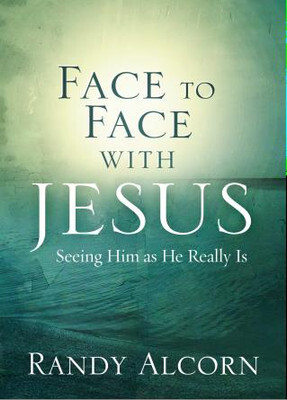 Face to Face with Jesus
Face to Face with Jesus 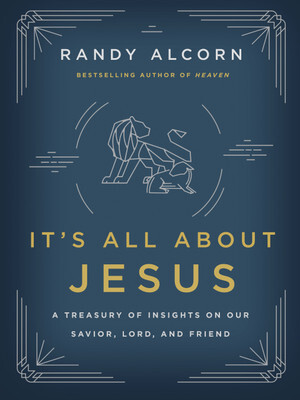 It's All About Jesus
It's All About Jesus
June 20, 2025
How Focusing on Heaven Energizes Your Life

This short video was filmed by Desiring God several years ago, but the message of living your life in light of eternity remains timeless:
https://www.youtube.com/watch?v=z1bLJwBC9Fs?si=AwDUPemPy-4RCnGc
Knowing that this present world will end and be resurrected into new heavens and a New Earth should profoundly affect our daily behavior. “...You ought to live holy and godly lives as you look forward to the day of God. . . . In keeping with his promise we are looking forward to a new heaven and a new earth, the home of righteousness. So then, dear friends, since you are looking forward to this, make every effort to be found spotless, blameless and at peace with him” (2 Peter 3:11-14, NIV).
If we understand what “a new heaven and a new earth” means, we’ll look forward to it. (And if we’re not looking forward to it, we must not yet understand it.) Anticipating our homecoming will motivate us to live spotless lives here and now.
Joni Eareckson Tada writes in Heaven: Your Real Home,
When a Christian realizes his citizenship is in heaven, he begins acting as a responsible citizen of earth. He invests wisely in relationships because he knows they’re eternal. His conversations, goals and motives become pure and honest because he realizes these will have a bearing on everlasting reward. …He gives generously of time, money, and talent because he’s laying up treasure for eternity. He spreads the good news of Christ because he longs to fill heaven’s ranks with his friends and neighbors. All this serves the pilgrim well not only in heaven, but on earth; for it serves everyone around him.
When we view today in light of the long tomorrow, the little choices become tremendously important. Whether I read my Bible today, pray, go to church, trust Christ through suffering, share my faith, and give my money—actions graciously empowered not by my flesh but by His Spirit—is of eternal consequence, not only for other souls, but for mine.
After all, what will last forever? God. God’s Word. People. Spending time in God’s Word and investing in people will pay off in eternity and bring me happiness and perspective now. This life need not be wasted. In small and often unnoticed acts of service to Christ, we can invest this life in eternity, where today’s faithfulness will forever pay rich dividends.
Not only will an eternal perspective change our actions, it will also change our attitudes. Living with eternity in mind will infuse us with a joy and purpose that can sustain us in daily life, even as we face hard things. Recognizing our future life on a resurrected Earth can help empower us to stick with a difficult marriage, to persevere in the hard task of caring for an ailing parent or child, or to stay with a demanding job. Moses stayed faithful to God because “he was looking ahead to his reward” (Hebrews 11:26).
Christ-centered righteous living today is directly affected by knowing where we’re going and what rewards we’ll receive there for serving Christ. After all, if we really believe we’re going to live forever in a realm where Christ is the center who brings us great joy, and that righteous living will mean happiness for all, why wouldn’t we choose to get a head start on Heaven through Christ-centered righteous living now? Do we really want to miss out on the true happiness that Jesus offers us here and for all of eternity?
Recommended Reading
 50 Days of Heaven (Special Edition)
50 Days of Heaven (Special Edition)  In Light of Eternity
In Light of Eternity  The Promise of the New Earth
The Promise of the New Earth
June 18, 2025
What N. T. Wright Gets Wrong on the Issue of Abortion

Doug Groothuis, a philosopher, author, and professor, shared on his Facebook these thoughts about recent comments made by N. T. Wright about abortion:
Wright as Wrong on Abortion
Thomas Sowell was right: Expertise is not transferable. Don’t ask physicists about theology. Don't ask psychologists about history. Don't ask (at least one) New Testament scholars about abortion; that is, don’t ask N. T. Wright, who is dead wrong on the ethics of abortion as his recent podcast revealed. He thinks potential fetal deformity, as well as rape and incest, are valid reasons for abortion.
He is wrong and guilty before God for this error.
1. All humans, born and unborn, are made in God's image
2. Because of (1), they have the objective negative right not to be murdered. This is human dignity.
3. Abortion murders an unborn child made in God's image who has the objective right to live (2).
4. Therefore, abortion is morally wrong.
How the child was conceived or what deformities the child may have are morally irrelevant, since the dignity of human life trumps these concerns.
In a sense, there are no exceptions, because no procedure should be one the purpose of which is to kill an unborn child. In exceedingly rare cases, the child may have to die in a procedure to save the life of the mother. However, a true doctor always tries to save the lives of all his patients, mother and baby.
I write more about this in my forthcoming book, Taking Back the Truth, in the chapter, “The Truth about the Value of Human Life.”
John Stonestreet and Shane Morris share more in this commentary on Breakpoint:
Recently, the eminent British theologian and former Bishop of Durham N.T. Wright, who is famous for his defense of the doctrine of Resurrection, showed a shocking lack of familiarity with the basic moral case against abortion. Answering a question on his “Ask N.T. Wright Anything” podcast, Wright asserted that abortion can sometimes be the best choice:
[T]here are many, many cases where it is about the mother’s health versus the health of the child. … And particularly, as you cited, in cases of rape, in cases of incest, there may be a very, very strong argument for saying, ‘this ought never to have happened.’ And with sorrow—because we do not want to do this in principle—but with sorrow and a bit of shame, the best thing to do is as soon as possible to … terminate this pregnancy.
Wright went on to emphasize that killing a later-term baby is “repulsive,” and rivals the evil of post-birth infanticide, which he called “pagan,” and said early Christians were correct to oppose.
But what is a “later-term baby”? Wright said he doesn’t consider himself qualified to make that judgment, partly because “it’s very hard for a man to talk about this.” Also, he considers men who are dogmatic about abortion to be “bullying” women. He then said that “I am not medically qualified to say what point I would draw a line … [when] this is a viable human being that should, then, be cherished.”
So, according to Wright, abortion is sometimes the best course of action, especially in cases of rape, incest, and “severe deformity.” In these cases, it should be done with “sorrow” and “shame” but “as soon as possible” to avoid committing the morally “repulsive” act of late-term abortion, which is comparable to infanticide. When and where that moral line exists is not for men (as opposed to women) without medical degrees to say, even though he immediately added that viability is the moral line when a child should be “cherished.”
But why should abortion be performed with “sorrow” and “shame” unless it’s wrong? And if it is wrong, how would killing an innocent human be compassionate for someone suffering deformity? How does another evil undo the evil of rape or incest? What about the “many, many” other cases he alluded to where it is “about the mother’s health” (he explicitly included “mental health”) “versus the health of the child”? Who makes that call? What kind of abortion couldn’t be justified by appealing to mental health?
For that matter, why should a human with “severe deformity” only be killed before birth but not afterwards? And if Wright doesn’t have the credentials or chromosomes to say when a child should be cherished, how does he know it has anything to do with viability?
Every one of Wright’s arguments are familiar and his inconsistency obvious. In fact, that’s the point of these re-hashed arguments for abortion. The scattershot approach confuses the issue rather than illuminates it, and they all start with the premise that the preborn aren’t valuable human beings. That Wright has absorbed them and is repeating them shows he is either unaware or intentionally ignoring the actual case for life. It also shows that even if pro-lifers are tired of making basic pro-life arguments, we must continue to make them, even to eminent theologians.
In fact, the concise formulation of the pro-life argument by Scott Klusendorf, author of The Case for Life, exposes every one of Wright’s claims:
Premise 1: It is always wrong to intentionally kill an innocent human being.
Premise 2: Abortion kills an innocent human being.
Conclusion: Abortion is always wrong.
Anyone who thinks abortion is “the best thing to do” in some circumstances must either disprove one or both of these premises or show the conclusion is somehow invalid. Wright waffles on this task.
In another problematic answer, Wright seemed to question whether a belief in Jesus’ bodily resurrection is essential for Christians, including for fellow theologians who know better what is at stake. Such people can love Jesus, Wright said. They’re just “very, very muddled.” This very muddled statement, especially when applied to studied Biblical scholar Marcus Borg, contradicts Paul’s assertion about the physical resurrection and the faith. It’s especially disheartening coming from Tom Wright, whose book defending the Resurrection, is incredible.
Wright’s long list of books and teachings on Scripture and Jesus have been of enormous benefit to the Church and make him one of the preeminent scholars of our lifetime. All truth is God’s truth, including the truth he articulates in his work. But so is the truth about the preborn and the evil of abortion. Even basic truths must be repeated and defended, and at times to fellow Christians who ought to know better than anyone else.
While teaching a course at Veritas Evangelical Seminary, I talked about abortion when rape or incest is involved. As I say in the video, this is an extremely important argument to address, because it takes otherwise prolife people and makes them prochoice. If we follow this reasoning to its logical conclusion, and those are seen as legitimate exceptions, then we can work backwards to make exceptions for all other kinds of cases, and in what sense are we still prolife?
https://player.vimeo.com/video/233720940?h=614eb41ae8
EPM has also addressed the issue of abortion in the case of disability:
No Matter How Painful the Situation, Ending a Disabled Child’s Life Through Abortion Is Never Right
A Paralympic Swimmer’s Story and the Value of Every Child’s Life, No Matter the Challenges They Face
Disabled Children and Our Cultural Blindspot
And here is my response to the question, “What About a Woman Whose Life Is Threatened by Pregnancy or Childbirth?”
Recommended Reading
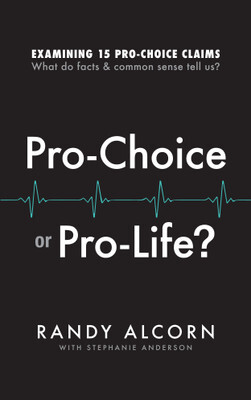 Pro-Choice or Pro-Life?
Pro-Choice or Pro-Life? 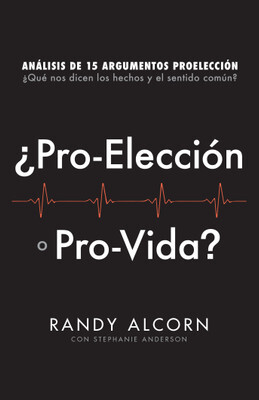 ¿Proelección o Provida? (Pro-Choice or Pro-Life? in Spanish)
¿Proelección o Provida? (Pro-Choice or Pro-Life? in Spanish)
June 16, 2025
Why My Diabetes Is One of the Best Things That’s Ever Happened to Me

In July 1985 I became an insulin-dependent diabetic, and my first book, Money Possessions, and Eternity, was published. It was one of the best things that ever happened to me—becoming a diabetic, I mean. Getting published was good too, but it didn’t do nearly as much for my spiritual life as getting sick did.
I had always been a strong and healthy person. Suddenly, four to five times a day, I needed to take blood tests and stick a needle in my side to inject insulin. (In the last few years, I’ve transitioned to a pump.) I’ve kept that up for forty years, every day without exception. There are times when I feel pretty lousy. I’m often tired, and my blood sugar sometimes swings up and down. When it’s up, I feel very tired; when it’s down, I get weak and become confused and disoriented. I begin to say things that don’t make sense. (A friend of mine teases me about this, but I point out to him that in those moments I’m acting like he acts all the time.)
So why do I say becoming an insulin-dependent diabetic was one of the best things that’s ever happened to me? There are a lot of reasons. One is that I understand weak, sick, and hurting people in a way I never did when I was strong and healthy. There’s a tendency for the healthy to have one basic response to the sick and weak, and that’s “suck it up.” Now, I’m all for sucking it up, and often that’s very good advice, but it’s also true that some things are outside of our control.
Gaining a sense of recognition of how my life has been outside of my control all along has had a profound effect on me. I had always been self-sufficient and independent, more like my father than I care to admit. He was an independent, self-sufficient unbeliever, and I was an independent, self-sufficient believer. But neither of us would be characterized as needy, at least not on the outside. We were in control, and we took pride in being in control. I was a decent pastor, and I could usually count on my mind working well. (I’m so grateful my dad admitted his spiritual need and came to faith at age 84.)
God has been very gracious to allow me not to experience the debilitating effects some insulin-dependent diabetics undergo. I’m still active—I do a lot of cycling and I played tennis for years. Hopefully my mind is still operative (though I may not be the best person to judge that!). But in any case, I look at life differently than I used to. I don’t take for granted what it means to feel good. I don’t assume I can just get out and handle any situation that comes along. Sometimes I need to rest or get help, or eat something to get my blood sugar up. I used to skip meals, and never felt weak as a result. Now I can’t do that.
In other words, I’ve become less independent and self-sufficient. I also think God has done for me what He did for Paul when He sent him his thorn in the flesh, which Paul talks about in 2 Corinthians 12. Paul acknowledged that his physical illness was a messenger from Satan. But he realized that Satan, in turn, was on God’s leash. God sovereignly governs the acts of Satan. Therefore, Paul could see the hand of God in his disease. That’s why he said that his physical problem was given to him to keep him from becoming conceited (2 Corinthians 12:7).
Paul might have been tempted to believe all the great things people said about him. His thorn of the flesh was a reminder he was completely dependent upon God. Paul says God’s word to him was “My grace is sufficient for you, for my power is made perfect in weakness” (2 Corinthians 12:9).
So this is what I’ve learned from being diabetic: all I have to offer is the weakness. God alone offers the strength. When I go on a speaking engagement, when I travel, when I sit down to write, I am acutely aware that I don’t have the skill or the power to pull this off. If it’s going to impact lives for eternity, that will have to be a supernatural work of the Holy Spirit. I just don’t have what it takes.
Charles Spurgeon wrote, “I venture to say that the greatest earthly blessing that God can give to any of us is health, with the possible exception of sickness.... If some men that I know of could only be favoured with a month of rheumatism, it would, by God’s grace, mellow them marvelously.”
Though he sought to avoid suffering, Spurgeon said, “I am afraid that all the grace that I have got of my comfortable and easy times and happy hours, might almost lie on a penny. But the good that I have received from my sorrows, and pains, and griefs, is altogether incalculable.... Affliction is the best bit of furniture in my house. It is the best book in a minister’s library.”
I can vouch for what Spurgeon said. Understanding my insufficiency and dependence is the best thing that ever happened to me. Without the disease God gave me, I wouldn’t have learned that truth. That’s why I stopped praying years ago that God would take away my diabetes. Of course, if He did, I wouldn’t complain, but the truth is that if I were given the power to snap my fingers to take the disease away, I wouldn’t do it. God knows far better than I that He has given me diabetes. This may sound strange when you hear the health and wealth gospel that promotes the belief that God wants us all healthy. As God demonstrated in giving Paul his thorn in the flesh, He sometimes has better things in mind than our health.
Recommended Reading
 90 Days of God's Goodness
90 Days of God's Goodness  If God Is Good (Paperback)
If God Is Good (Paperback)  Money, Possessions and Eternity
Money, Possessions and Eternity
June 13, 2025
Perspectives for Those Experiencing Heartache Over a Family Member’s Choices

What follows is an edited version of an email I sent to a friend who faced a heartbreaking situation involving a family member. I’m sharing it because it can apply to any faithful, godly person dealing with tragic events caused by a child’s, spouse’s, or parent’s bad choices. If that’s you, may our Heavenly Father use these words to encourage, strengthen, and comfort you.
When hearing about painful family situations that many of God’s people face, words fail me, so let me share some things from His Word, which will never fail and which will not return to God empty without accomplishing His purpose (see Isaiah 55:11).
God knows what it’s like to pour His heart into beloved people and not see lasting change. He calls Israel His bride and then His vineyard and says in Isaiah 5, “What more could have been done for my vineyard than I have done for it? When I looked for good grapes, why did it yield only bad?”
He doesn’t simply understand your broken heart because He knows everything; He understands because His heart has also been broken. Jesus is the God-man, tested in every way we are (Hebrews 4:15), including heartbreak. He wept over the people He loved, that same Jerusalem:
As he approached Jerusalem and saw the city, he wept over it and said, “If you, even you, had only known on this day what would bring you peace—but now it is hidden from your eyes. The days will come upon you when your enemies will build an embankment against you and encircle you and hem you in on every side. They will dash you to the ground, you and the children within your walls. They will not leave one stone on another, because you did not recognize the time of God’s coming to you.” (Luke 19:41-44)
Your faithfulness and love and prayers for your family member have not been unnoticed by the eyes of Heaven. Jesus said, “And if anyone gives even a cup of cold water to one of these little ones who is my disciple, truly I tell you, that person will certainly not lose their reward” (Matthew 10:42). Those who have faithfully loved and prayed for their family members have done far more than give them a cup of cold water. They have given their hearts.
Rest assured that God has seen all your lonely and despairing moments, and all your tears. He does not forget—in fact, He makes a permanent record which will be documentation for the abundant reward He will one day joyfully give you: “You keep track of all my sorrows. You have collected all my tears in your bottle. You have recorded each one in your book” (Psalm 56:8).
God’s eyes are as wide open to you as His heart is. He is by nature a Rewarder (Hebrews 11:6), and while you may not be thinking of the reward as you faithfully love and pray for your family member, nevertheless it will be His delight to reward you, and that reward will be great. He wants that reality to comfort you. Even if it seems like your love and God’s love for your family member hasn’t yielded the fruit you have prayed for, remember that “God is not unjust; he will not forget your work and the love you have shown him as you have helped his people and continue to help them” (Hebrews 6:10).
As you move forward with your life, may you sense His love even in the heartache. “The LORD is for me; I will not fear; What can man do to me?” (Psalm 118:6). Or as He says in Romans 8, “If God be for us, who can be against us?” and “Nothing in all creation can separate us from the love of God in Christ Jesus our Lord.” As He said to Abraham in Genesis 15, “Do not be afraid. I am your shield, your exceedingly great reward.”
God is not done with Jerusalem yet, and He can still touch your family member too, perhaps all the more in the ashes of their derailed life. In Isaiah 65 He promises all of us a new heavens and New Earth, then says, “But be glad and rejoice forever in what I will create, for I will create Jerusalem to be a delight and its people a joy. I will rejoice over Jerusalem and take delight in my people; the sound of weeping and of crying will be heard in it no more” (v. 18-19).
After God Himself (Immanuel, God with us) promises to come down to forever live with His people in the New Jerusalem on the New Earth, He says in Revelation 21:4, “God will wipe every tear from their eyes, and there will be no more death or sorrow or crying or pain. All these things are gone forever.”
Yes, the day hasn’t yet come when God will “wipe away every tear.” But it will come.
In the meantime, God can give us hope for a future where He will heal all our hurts and where our laughter and joy will be as unending as His. May we sense His presence with us here and now, even in the midst of life’s greatest difficulties. This is not the end of the story, and His blood-bought promise is to make all things right forever.
Recommended Reading
 90 Days of God's Goodness
90 Days of God's Goodness 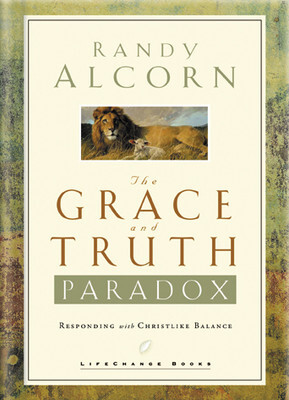 The Grace and Truth Paradox
The Grace and Truth Paradox



